Japan awaits capsule's return with asteroid soil samples
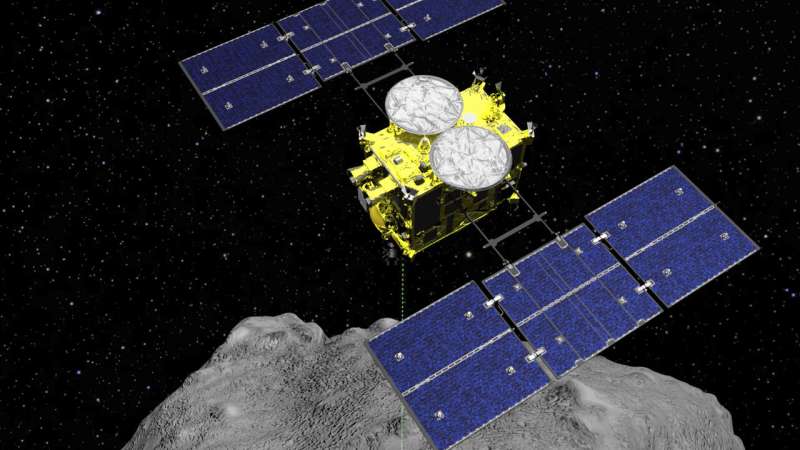
Japan's Hayabusa2 spacecraft successfully released a small capsule on Saturday and sent it toward Earth to deliver samples from a distant asteroid that could provide clues to the origin of the solar system and life on our planet, the country's space agency said.
The capsule successfully detached from 220,000 kilometers (136,700 miles) away in a challenging operation that required precision control, the Japan Aerospace Exploration Agency said. The capsule—just 40 centimeters (15 inches) in diameter—is now descending and is expected to land Sunday in a remote, sparsely populated area of Woomera, Australia.
"The capsule has been separated. Congratulations," JAXA project manager Yuichi Tsuda said.
Hayabusa2 left the asteroid Ryugu, about 300 million kilometers (180 million miles) away, a year ago. After it released the capsule, it moved away from Earth to capture images of the capsule descending toward the planet as it set off on a new expedition to another distant asteroid.
About two hours later, JAXA said it had successfully rerouted Hayabusa2 for its new mission, as beaming staff exchanged fist and elbow touches at the agency's command center in Sagamihara, near Tokyo.
"We've successfully come this far, and when we fulfill our final mission to recover the capsule, it will be perfect," mission manager Makoto Yoshikawa said from the command center during a livestreaming event.
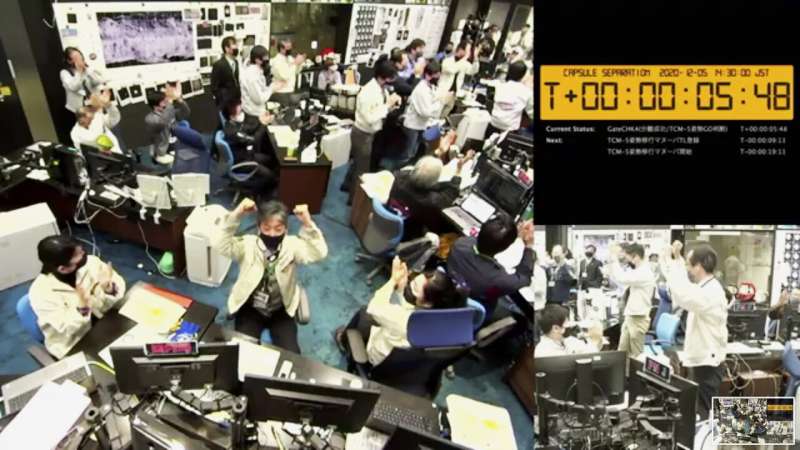
People who gathered to watch the capsule's separation at public viewing events across Japan cheered the success. "I'm really glad that the capsule has been successfully released. My heart was beating fast when I was watching," said Ichiro Ryoko, a 60-year-old computer engineer who watched at Tokyo Dome.
Hayabusa2's return with the world's first asteroid subsurface samples comes weeks after NASA's OSIRIS-REx spacecraft made a successful touch-and-go grab of surface samples from asteroid Bennu. China, meanwhile, announced this week that its lunar lander collected underground samples and sealed them within the spacecraft for their return to Earth, as space developing nations compete in their missions.
In the early hours of Sunday, the capsule, protected by a heat shield, will briefly turn into a fireball as it reenters the atmosphere 120 kilometers (75 miles) above Earth. At about 10 kilometers (6 miles) aboveground, a parachute will open to slow its fall and beacon signals will be transmitted to indicate its location.
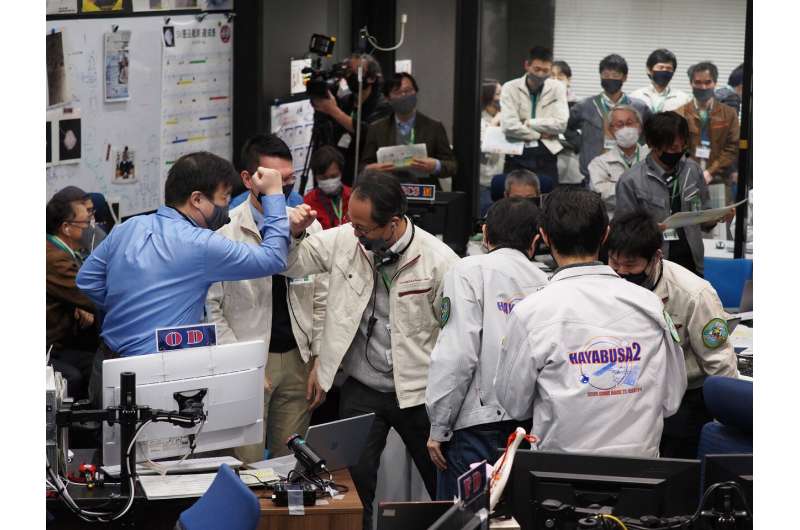
JAXA staff have set up satellite dishes at several locations in the target area to receive the signals. They also will use a marine radar, drones and helicopters to assist in the search and retrieval of the pan-shaped capsule.
Australian National University space rock expert Trevor Ireland, who is in Woomera for the arrival of the capsule, said he expected the Ryugu samples to be similar to the meteorite that fell in Australia near Murchison in Victoria state more than 50 years ago.
"The Murchison meteorite opened a window on the origin of organics on Earth because these rocks were found to contain simple amino acids as well as abundant water," Ireland said. "We will examine whether Ryugu is a potential source of organic matter and water on Earth when the solar system was forming, and whether these still remain intact on the asteroid."
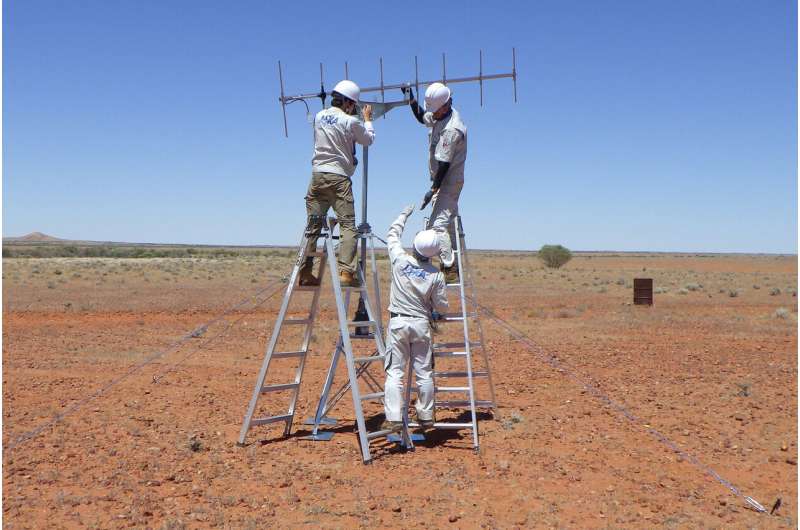
Scientists say they believe the samples, especially ones taken from under the asteroid's surface, contain valuable data unaffected by space radiation and other environmental factors. They are particularly interested in analyzing organic materials in the samples.
JAXA hopes to find clues to how the materials are distributed in the solar system and are related to life on Earth. Yoshikawa, the mission manager, said 0.1 gram of the dust would be enough to carry out all planned researches.
For Hayabusa2, it's not the end of the mission it started in 2014. It is now heading to a small asteroid called 1998KY26 on a journey slated to take 10 years one way, for possible research including finding ways to prevent meteorites from hitting Earth.
So far, its mission has been fully successful. It touched down twice on Ryugu despite the asteroid's extremely rocky surface, and successfully collected data and samples during the 1½ years it spent near Ryugu after arriving there in June 2018.
-
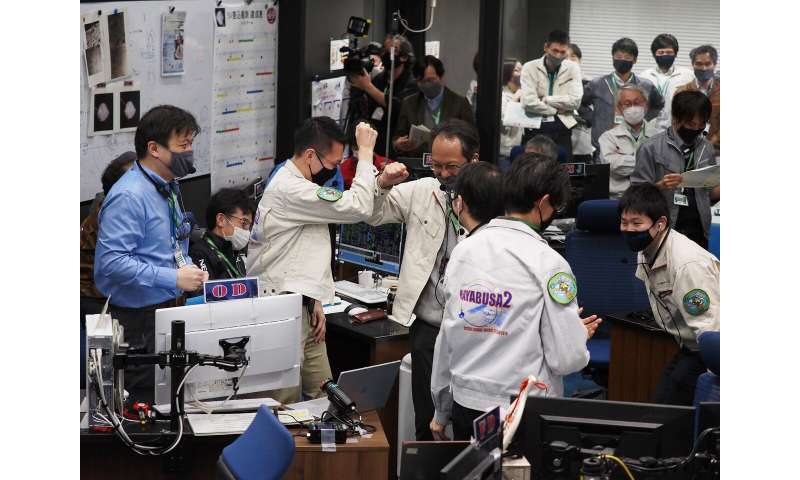
Project members celebrate as the success of trajectory control maneuver to withdraw from the Earth's sphere is confirmed, at a control room of JAXA's Sagamihara Campus in Sagamihara, near Tokyo Saturday, Dec. 5, 2020. Hayabusa2 successfully released a small capsule on Saturday and sent it toward Earth to deliver samples from a distant asteroid that could provide clues to the origin of the solar system and life on our planet, the country's space agency said. (JAXA via AP) -
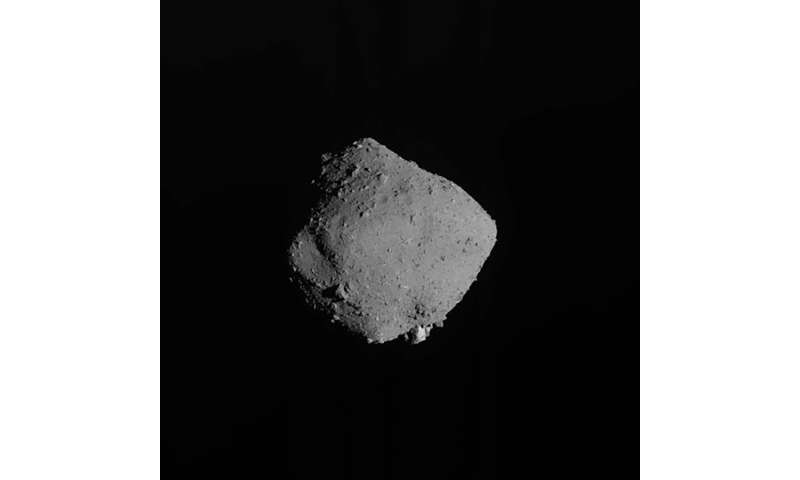
In this Nov. 13, 2019, file image released by the Japan Aerospace Exploration Agency (JAXA), shows asteroid Ryugu taken by Japan's Hayabusa2 spacecraft. The Japanese space agency said Friday they are all set for the spacecraft′s final approach to Earth this weekend to deliver a capsule containing valuable samples of a distant asteroid that could provide clues to the origin of the solar system. (JAXA via AP, File) -
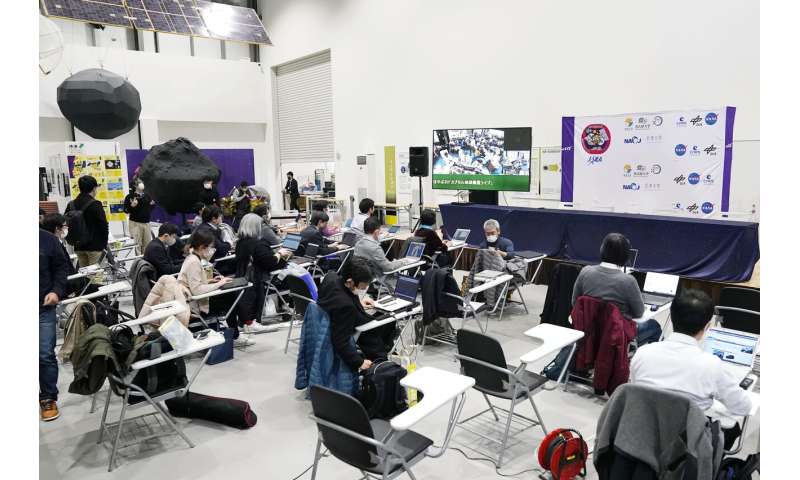
Journalists wait for the start of a live telecast at JAXA's Sagamihara Campus in Sagamihara, near Tokyo Saturday, Dec. 5, 2020. Japan's space agency said its final checks confirmed the Hayabusa2 spacecraft is on track to return to Earth a capsule containing samples from a distant asteroid that could provide clues to the origin of the solar system and life on our planet. (Shohei Miyano/Kyodo News via AP) -
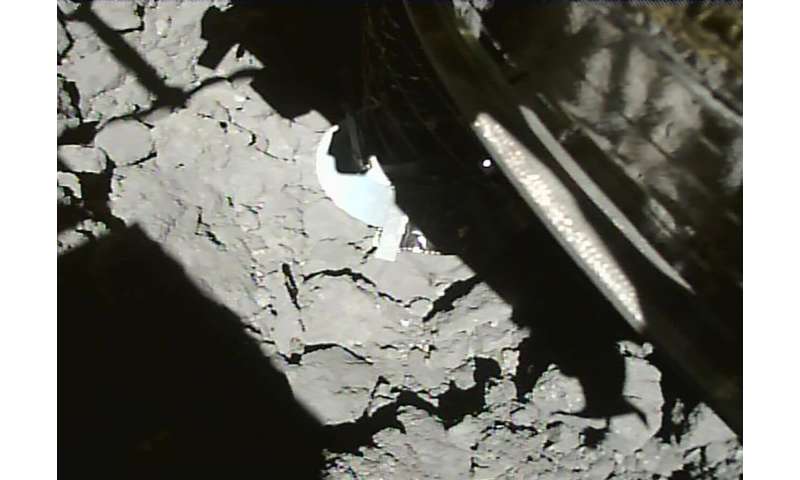
In this file image taken and released on Thursday, July 11, 2019, by the Japan Aerospace Exploration Agency (JAXA), the Japanese Hayabusa2 spacecraft lands on an asteroid to collect samples. The Japanese space agency said Friday they are all set for the spacecraft′s final approach to Earth this weekend to deliver a capsule containing valuable samples of a distant asteroid that could provide clues to the origin of the solar system. (JAXA via AP, File) -
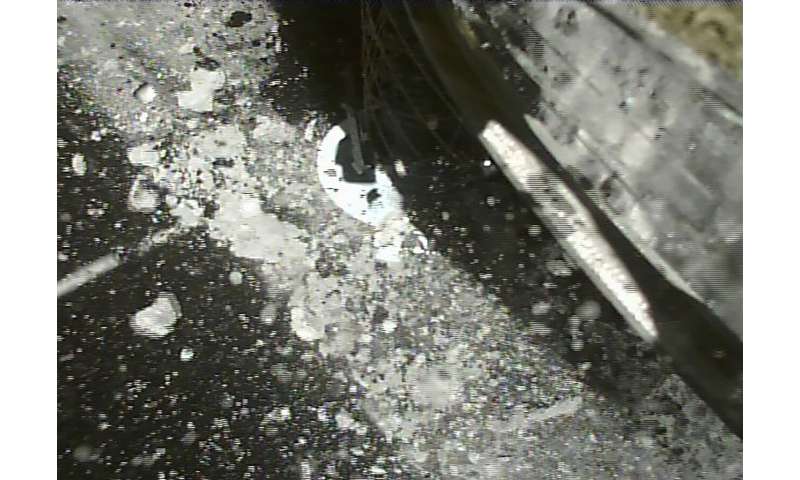
In this file image taken and released on July 11, 2019, by the Japan Aerospace Exploration Agency (JAXA), the Japanese Hayabusa2 spacecraft lands on an asteroid to collect samples. The JAXA performed a series of operations for the second touchdown of Asteroid Explorer "Hayabusa2" on the Ryugu asteroid and the collection of its soil samples. (JAXA via AP, File) -
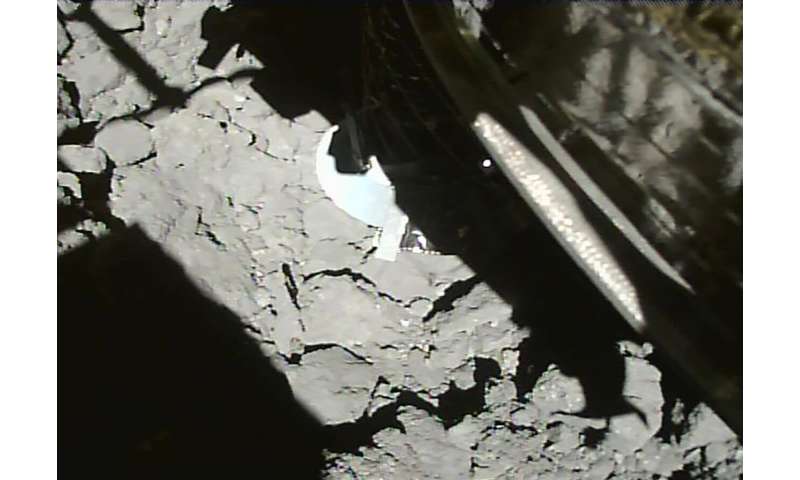
In this file image taken and released on Thursday, July 11, 2019, by the Japan Aerospace Exploration Agency (JAXA), the Japanese Hayabusa2 spacecraft lands on an asteroid to collect samples. The Japanese space agency said Friday they are all set for the spacecraft′s final approach to Earth this weekend to deliver a capsule containing valuable samples of a distant asteroid that could provide clues to the origin of the solar system. (JAXA via AP, File) -
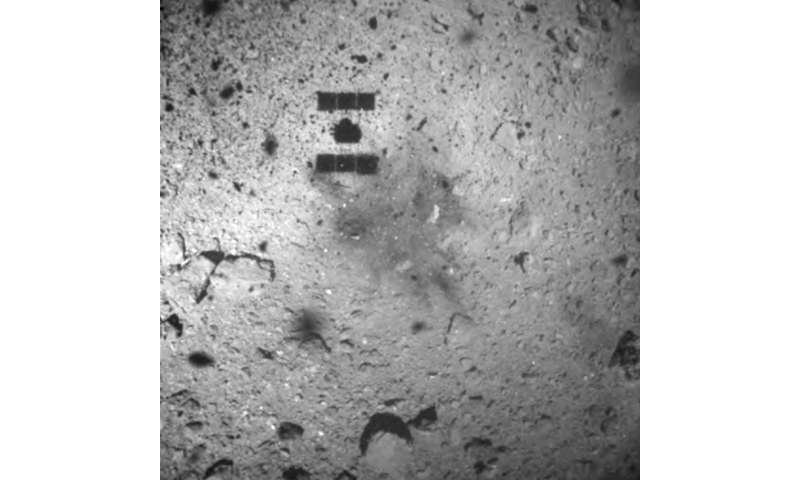
This Feb. 22, 2019, file image released by the Japan Aerospace Exploration Agency (JAXA) shows the shadow, center above, of the Hayabusa2 spacecraft after its successful touchdown on the asteroid Ryugu. The Hayabusa2 spacecraft left the asteroid Ryugu, about 300 million kilometers (180 million miles) from Earth, a year ago and is expected to reach Earth and drop a capsule containing the precious samples in southern Australia on Dec. 6. (JAXA via AP, File) -
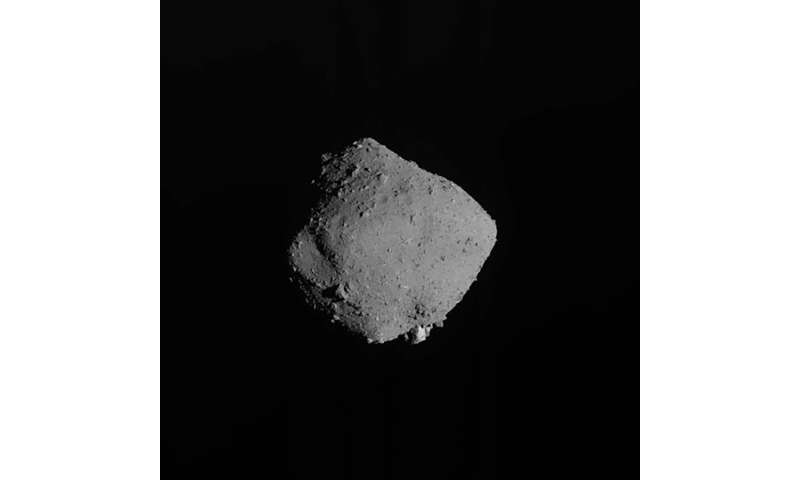
In this Nov. 13, 2019, file image released by the Japan Aerospace Exploration Agency (JAXA), shows asteroid Ryugu taken by Japan's Hayabusa2 spacecraft. The Japanese space agency said Friday they are all set for the spacecraft′s final approach to Earth this weekend to deliver a capsule containing valuable samples of a distant asteroid that could provide clues to the origin of the solar system. (JAXA via AP, File) -
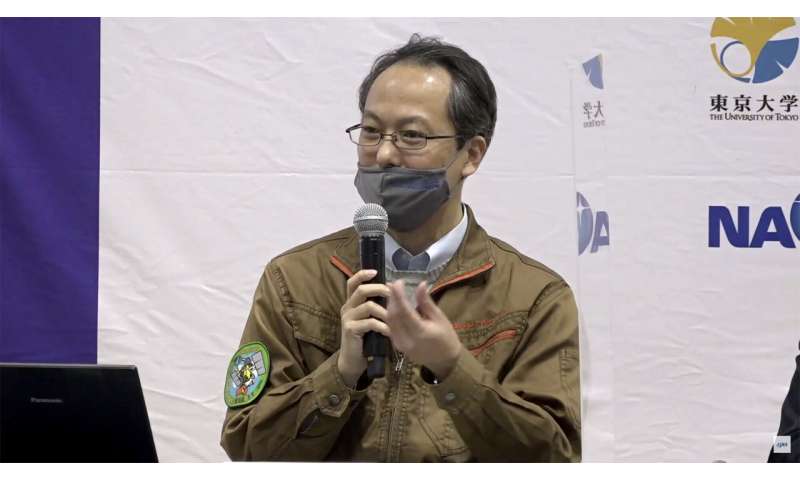
In this image made from youtube video provided by JAXA, its project manager Yuichi Tsuda speaks during a press conference in Sagamihara, near Tokyo, Friday, Dec. 4, 2020. The Japanese space agency said Friday they are all set for its spacecraft′s final approach to Earth this weekend to deliver a capsule containing valuable samples of a distant asteroid that could provide clues to the origin of the solar system. (JAXA via AP)
In its first touchdown in February 2019, it collected surface dust samples. In a more challenging mission in July that year, it collected underground samples from the asteroid for the first time in space history after landing in a crater that it created earlier by blasting the asteroid's surface.
Asteroids, which orbit the sun but are much smaller than planets, are among the oldest objects in the solar system and therefore may help explain how Earth evolved.
Ryugu in Japanese means "Dragon Palace," the name of a sea-bottom castle in a Japanese folk tale.
© 2020 The Associated Press. All rights reserved. This material may not be published, broadcast, rewritten or redistributed without permission.



















